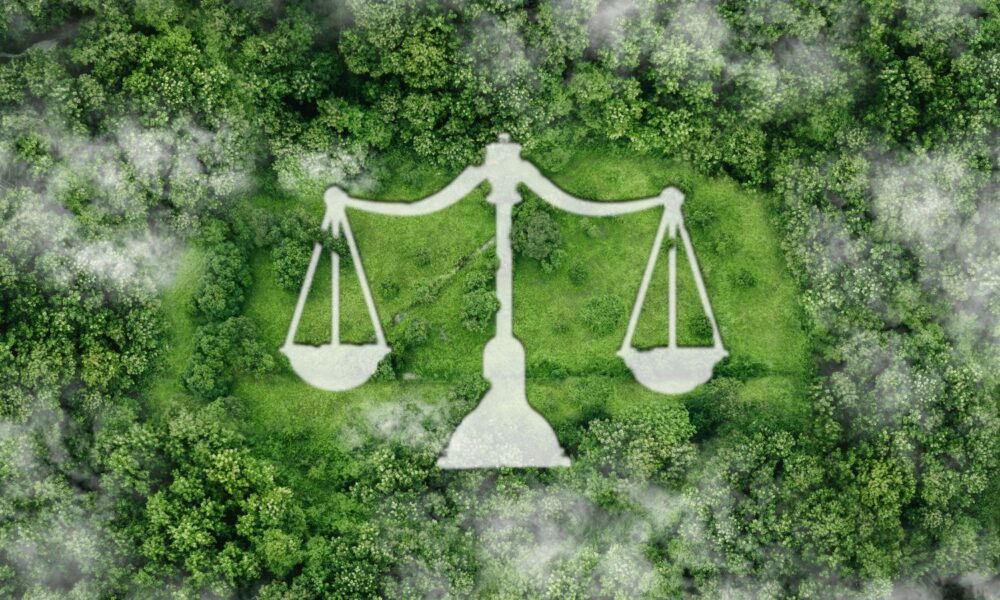Around the world, climate litigation is expanding in scale, scope, and impact. Courts are being asked to rule on fundamental questions of responsibility, accountability, and justice in the face of accelerating climate harms. But as these legal efforts grow stronger, they are also drawing intensified resistance.
This year’s Global Trends in Climate Change Litigation: 2025 Snapshot from the Grantham Research Institute at the London School of Economics provides a comprehensive look at how litigation has become both a global trend and a maturing tool for climate governance. The report tracks 2,967 climate-related legal cases filed to date across nearly 60 countries. In 2024 alone, at least 226 new climate cases were filed. More than 80% of them were considered strategic, which are cases designed not just to win individual relief, but to influence public policy, change corporate behavior, or clarify legal duties related to climate change.
Climate litigation cases filed globally and in the United States (1986–2024)

Perhaps most importantly, the report highlights a shift from courtroom victories to implementation. Increasingly, courts are issuing rulings that affirm the rights of people and obligations of states and companies. But just as courts are beginning to hold governments and corporations accountable, a coordinated political backlash is emerging to undermine this progress, discredit litigation efforts, and shield polluters from responsibility.
Key legal trends in climate litigation
The new report documents how courts around the world are advancing climate accountability by responding to a wave of strategic legal challenges. Three types of cases are reshaping expectations for governments, corporations, and financial institutions:
- Challenges to national climate policies and adaptation failures
Governments are being sued for not doing enough. These cases include challenges to the adequacy of national climate frameworks and to failures to prepare for foreseeable climate impacts like sea level rise and extreme heat. Courts are being asked to enforce not just emissions targets, but also obligations to protect people and infrastructure from worsening climate risks.
- Pressure on corporations and regulators to account for full emissions
Nearly 100 cases in 2024 targeted the lack of meaningful climate considerations in project approvals. These lawsuits increasingly focus on Scope 3 emissions, indirect emissions from downstream use of fossil fuels, which often exceed direct emissions and represent the majority of a project’s climate impacts.
In a landmark 2024 ruling, the United Kingdom Supreme Court found that downstream emissions from fossil fuel extraction are foreseeable and relevant, requiring them to be assessed during project approval. The Norwegian Supreme Court similarly suspended new oil field approvals until more robust climate reviews could be completed. In May 2025, the European Free Trade Association (EFTA) Court issued an advisory opinion affirming that Scope 3 emissions qualify as project-related effects under EU law. These cases mark a turning point: courts are now demanding rigorous, science-based justifications before high-emission projects move forward. - Accountability for both financial flows and past emissions
Litigation is extending to banks, pension funds, and insurers for failing to disclose climate-related risks or for breaching fiduciary duties by investing in fossil fuel infrastructure. At the same time, courts are increasingly open to the idea that companies may be held liable for their historic emissions. In Germany’s Lliuya v. RWE, the court reaffirmed that companies can face legal consequences for their proportional contributions to global climate harm.
Across these categories, legal reasoning is becoming more closely tied to scientific evidence. Courts are asking deeper questions about causation, accountability, and harm, demanding clearer data, and making decisions that reflect the realities of climate science.
Science is central and the need is growing
Science is essential at every stage of climate litigation. It informs how cases are built, how responsibility is assessed, and how remedies are designed. As climate litigation matures, so does the role of scientific evidence. In addition to understanding climate harms, courts are asking who is responsible, how risks can be quantified and what remedies are appropriate. Scientific research can help to inform these questions before the courts.
The Global Trends report points to a rising need for scientific evidence in areas like climate damages, fiduciary risk, and adaptation failures, particularly in cases where data is incomplete or standards are still emerging. As the focus shifts from landmark rulings to implementation and enforcement, science will remain a cornerstone for holding actors accountable and translating decisions into real-world outcomes. At its core, the role of science in climate litigation is to provide clarity, context, and rigor so that decisions are grounded in evidence.
US climate litigation faces legal and political attacks
While the global trends are clear, the situation in the United States is increasingly fraught. The report notes that the United States remains the country with the highest number of climate cases, with 164 new filings recorded in 2024 alone. Unlike many other countries, where federal governments are often the defendants, US litigation also features a growing number of cases in which communities, states, and individuals are challenging corporate actors directly. These include lawsuits brought by cities and states seeking damages for climate deception and harm caused by fossil fuel emissions.
However, the political environment around these cases is becoming increasingly hostile. At a recent Senate Judiciary Subcommittee hearing, a few members of Congress used their time to promote unsubstantiated claims aimed at discrediting climate litigation and those involved in it. These baseless accusations appear designed to distract from the real and growing legal exposure of fossil fuel companies
At the same hearing, Kansas Attorney General Kris Kobach urged Congress to amend federal environmental law to block state and local climate lawsuits against fossil fuel companies. His proposal would limit the ability of communities to pursue claims under well-established tort and consumer protection statues. It also challenges the authority of local and state governments to protect the health, safety, and economic security of their communities.
The stakes became even clearer with the release of a letter from sixteen Republican attorneys general to the Trump administration. The letter urges the administration to pursue legislation that would grant fossil fuel companies legal immunity from climate lawsuits. It also calls for the federal government to restrict funding to jurisdictions that bring such cases. If enacted, this would not only shield polluters from accountability, but punish communities for seeking justice. It is a direct attack on the principle of equal access to the courts and the foundational idea that the polluter should pay.
Where we go from here
Climate litigation is playing an increasingly important role in shaping how governments, companies, and financial institutions respond to climate change. These legal efforts bring scientific evidence into decision-making spaces, raise the profile of accountability, and have begun to influence both policy and practice.
But as recent pushback has illustrated, this moment is fragile. Right now the fossil fuel industry and its allies are working to rewrite the rules. Efforts to discredit litigation, limit access to the courts, or shield certain actors from liability threaten to slow progress and weaken long-standing legal principles.
Moving forward, continued engagement from communities, legal experts, policymakers, and scientists will be critical. As new cases are brought before courts and existing decisions shift to implantation and enforcement, there will be an ongoing need for rigorous, transparent, and relevant scientific input.

